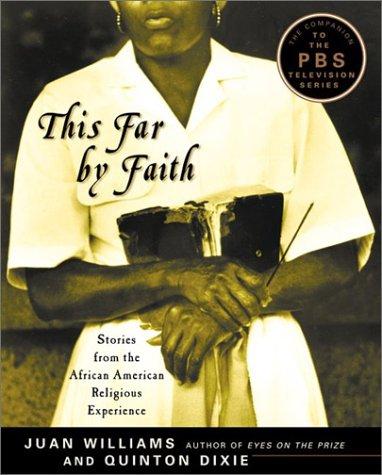This Far by Faith: Stories from the African American Religious Experience, published in 2003 by HarperCollins, is a compelling work by journalist and political analyst Juan Williams. It’s not a dry academic study, but a vibrant tapestry of personal narratives and historical accounts that illuminate the profound role of faith in the African American experience. Williams, known for his sharp insights and balanced perspective, brings a unique blend of journalistic rigor and heartfelt empathy to this subject. This book arrived at a pivotal time, a few years after 9/11, when many were grappling with questions of identity, community, and the power of belief. It serves as a timely reminder of the resilience and spiritual strength forged in the crucible of hardship and injustice.
Williams structures the book as a chronological journey, beginning with the forced conversion to Christianity during the transatlantic slave trade. He doesn’t shy away from the painful realities, the hypocrisy of slaveholders who used religion to justify their cruelty, and the ways in which enslaved people transformed that religion into something that nourished their souls and fueled their resistance. The narrative is rich with details that bring the past to life. We meet figures like Richard Allen, who founded the African Methodist Episcopal Church, and we hear the voices of countless ordinary people who found solace and strength in their faith. The book isn’t just a history lesson; it’s an emotional exploration of how spirituality can be both a source of comfort and a catalyst for change. The pacing is excellent, moving seamlessly between historical analysis and deeply moving personal stories. You can purchase a copy at Amazon.
The strength of This Far by Faith lies in its character-driven approach. Williams introduces us to an array of individuals, from charismatic preachers to humble churchgoers, and allows their stories to unfold. We see how the church became a refuge, a place of community and shared identity, where people could feel human in a world that often treated them as less than. The book is filled with accounts of courage and perseverance, of people who, despite the constant threat of violence and oppression, held fast to their faith and never lost hope. These are not just historical figures; they are people who faced challenges that resonate even today. Their struggles and triumphs, their doubts and certainties, make the narrative both compelling and deeply relatable.
The themes of resilience, community, and the power of faith resonate strongly throughout the book. Williams doesn’t shy away from the complex relationship between religion and social justice. He acknowledges the ways in which some religious institutions have been complicit in oppression, while highlighting the crucial role that the Black church has played in the fight for civil rights. It’s a balanced perspective that encourages critical reflection rather than blind acceptance. As someone who grew up in a secular household, I found myself deeply moved by the unwavering faith of these individuals. Their stories offered a different way of understanding the power of belief and its profound impact on identity and community. It also made me realize how crucial understanding these narratives are to understanding history. You can find the book through this Amazon link.
Williams’ writing style is accessible and engaging, making this book a compelling read for a wide audience. He seamlessly weaves together historical facts, personal anecdotes, and insightful analysis. The prose is clear and straightforward, avoiding academic jargon while still conveying complex ideas. He writes with a journalist’s precision but also with the passion of someone who clearly cares deeply about the subject. This is not a book that will overwhelm you with dense theory or complex arguments; instead, it invites you to walk alongside these people, to experience their struggles and triumphs, and to understand the profound impact of faith on their lives. The author’s voice is a strong presence throughout the narrative, providing context and guidance, yet never overshadowing the stories of the people he is writing about. This allows the reader to fully immerse themselves in the experience.
This Far by Faith is not just a book about the past; it’s a book about the ongoing struggle for justice and equality. It reminds us of the resilience of the human spirit and the power of community. The narratives it contains are not just historical; they are still relevant to understanding contemporary issues of race and faith. It’s a book that will challenge you to think differently about the role of religion in society and the importance of preserving the stories of those who have come before us. For anyone interested in understanding the African American experience, the power of faith, or the struggle for social justice, this book is an absolute must-read. If you are interested you can purchase through Amazon.
I would recommend this book to a wide range of readers, especially those interested in African American history, religious studies, or social justice movements. It is accessible to those with little prior knowledge of these topics but offers sufficient depth for those with a more academic background. It’s a book that can be read individually or used as a text for group discussions. If you enjoyed The Warmth of Other Suns by Isabel Wilkerson or Narrative of the Life of Frederick Douglass, you will likely find This Far by Faith equally compelling and insightful. These books share similar themes of resilience, identity, and the struggle for freedom. The power of the book is undeniable, and purchasing a copy through Amazon will be a worthy investment.

